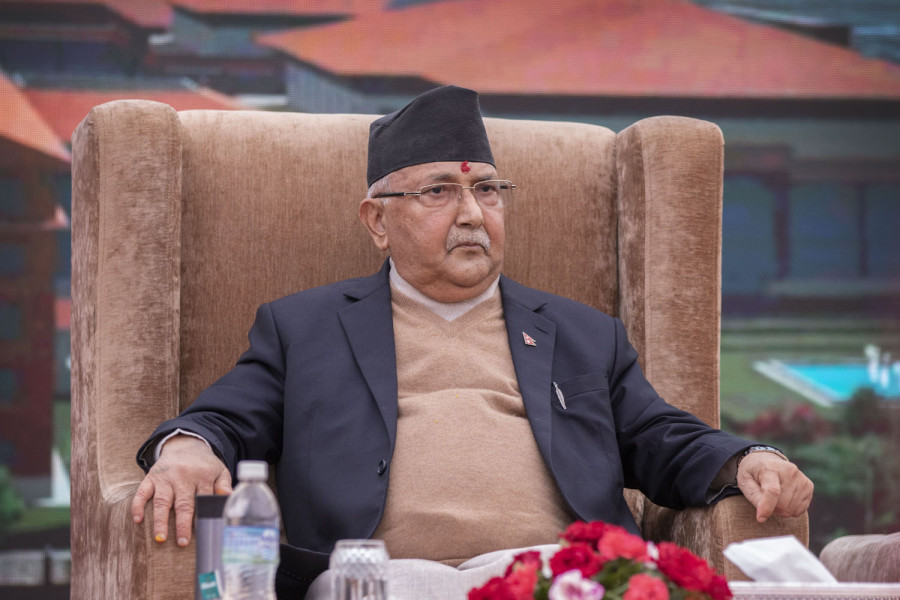Politics
Out of power, what has Oli up his sleeve?
UML leaders say they’ll strengthen the party, aiming to win enough seats to form majority government next election.
Tika R Pradhan
CPN-UML vice-chair Asta Laxmi Shakya lost the vice-presidential election on Friday. A week ago, the party’s another vice-chair, Subas Nemang, was defeated in the presidential race.
This outcome for the second largest party in the House of Representatives may be unexpected but it's because it had to quit the ruling alliance over differences with the CPN (Maoist Centre) two weeks ago.
With Prime Minister Pushpa Kamal Dahal supporting the Nepali Congress in the presidential vote, the coalition led by the UML and Maoist Centre started to crumble within two months of its abrupt formation.
Dahal became the country's new prime minister on December 25 with the backing of the UML. The Maoist Centre chair had sought the UML’s support after the Congress ditched him despite the two parties going to the elections in an alliance.
Given the unease seen in UML leaders lately and the party’s disruptive role in the last leg of the earlier House, analysts are closely watching the UML’s strategy in the changed circumstances.
Both the Maoists and UML leaders give different reasons for their breakup. Unless the tide turns, the UML’s losing spree is expected to go to some length. Having lost its share in the federal government, the party will next have to forgo its positions in provincial governments.
“Since both Maoist and UML leaders didn’t learn any lesson from their recent experiences, they could not stand together even for two months,” said Mani Thapa, a standing Committee member of the UML, who is a former Maoist. “Now the UML should focus on standing alone, gaining a majority in the next elections, instead of trying to clinch power again.”
However, not all UML leaders, especially its chair, agree with this idea. KP Sharma Oli had hinted that his party would not remain idle but continue its efforts to break this coalition.
“We have not promised to never cooperate with the Congress,” Oli told reporters after the presidential vote on March 9.
Sources in the Congress party said Oli had offered his party’s support to the largest party if its president, Sher Bahadur Deuba, made efforts to lead the government for five whole years, by staying out of it. But that didn’t work as Congress leaders did not readily trust him.
Oli has hinted that the party will work hard to break this alliance in whatever way possible and if not, lay the ground for mid-term polls.
“Conflict will begin once the prime minister [Dahal] reshuffles this Cabinet,” said Padma Kumari Aryal, a UML secretary. “We will see how long this coalition of so many parties lasts.”
Aryal said her party will wait and watch how things unfold.
With a new coalition in place, the provincial governments will gradually crumble with the Congress replacing the UML in all the provinces, except Sudurpaschim, where the Congress chief minister has won the vote of confidence.
The first casualty among the UML chief ministers was in Sudurpaschim before the formation of the new coalition after one of its constituents, Nagarik Unmukti Party refused to vote for the UML member. Now, with a new coalition of 10 parties on board, including the five of the previous alliance, UML-led governments in the provinces will soon collapse.
Currently, the UML is leading three provincial governments—in Koshi, Gandaki and Lumbini, while the Maoist Centre has its chief ministers in Bagmati and Karnali. The Janata Samajbadi Party leads the Madhesh government while the Congress snatched the reins in Sudurpaschim.
With a reshuffle in the Dahal-led federal government after the March 20 vote of confidence, all three UML-led provincial governments will be re-formed.
Bagmati Chief Minister Shalikram Jamkattel, a Maoist member, has announced to go for a floor test of the provincial assembly on March 22. This could set off a change in all UML-led provincial governments.
According to the prime minister’s secretariat, Dahal will give a full shape to his Cabinet appointing ministers from new coalition partners after winning the trust vote.
Some UML leaders said the party will now focus on its roles in Parliament and the streets.
“Our parliamentary party has already written to the parliament secretariat demanding the main opposition status,” said Surendra Pandey, vice-chair of the UML. “Now we will focus on strengthening our organisational base.”
The party is on a two-month-long ‘mission grassroots’ campaign, which ends on April 22. UML leaders say they plan to give continuity to the campaign even after the monsoon.
As the main opposition, the party would now strongly oppose the government’s wrong actions and policies.
One major strategy of the UML is to attract leaders and cadres from the CPN (Unified Socialist) and the Maoist Centre, observers said. Madhav Kumar Nepal chairs the Unified Socialist formed by a UML splinter group in 2021.
Some Maoist leaders claimed that the major reason behind the prime minister’s disenchantment with the UML was Oli’s move to undermine their party and his non-cooperation to end the peace process.
Political analysts, however, say the UML won’t be able to break the existing coalition.
“Dahal realised that allowing the UML to elect its presidential candidate would concentrate the power of that party,” said Hari Roka, a political analyst.
He said the UML would do all it can to break the Congress-Maoist coalition and to lead the country towards mid-term elections.
“Oli will try to disturb Parliament and also block appointments to constitutional bodies, but that would backfire,” Roka told the Post.




 8.22°C Kathmandu
8.22°C Kathmandu















